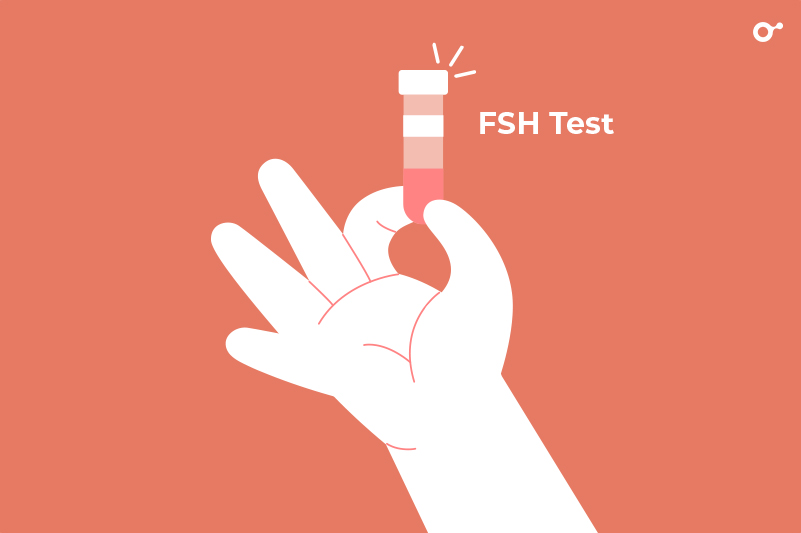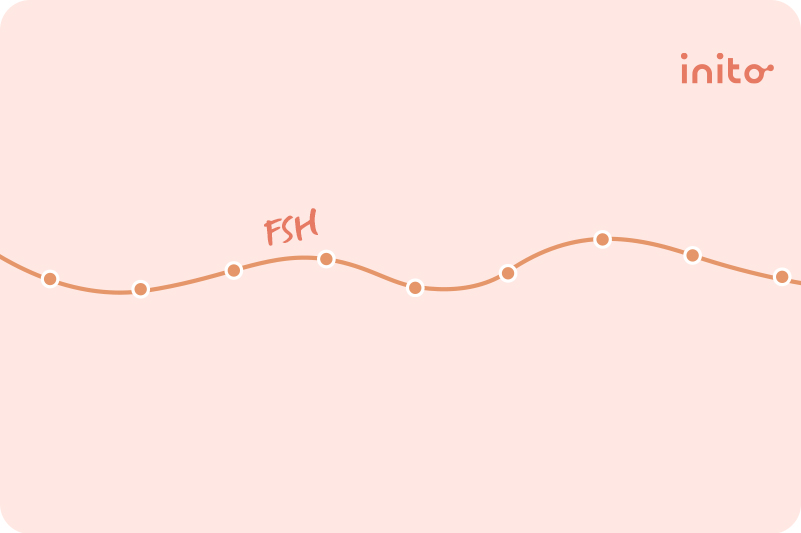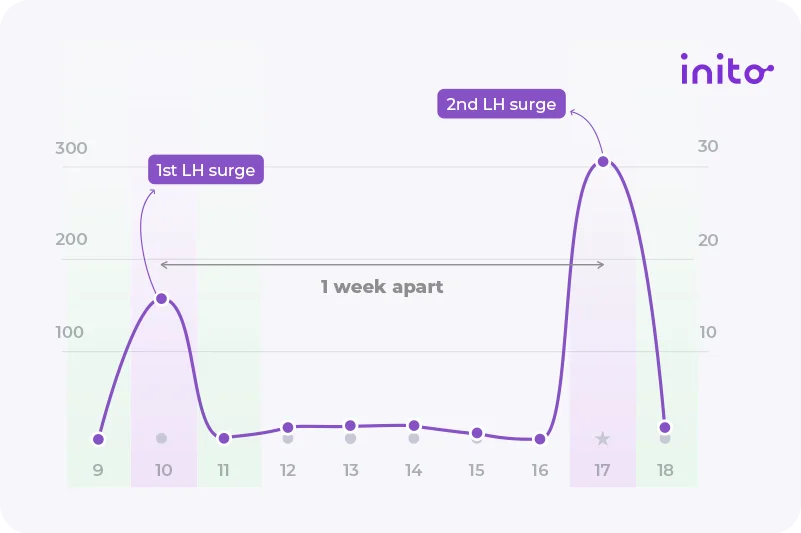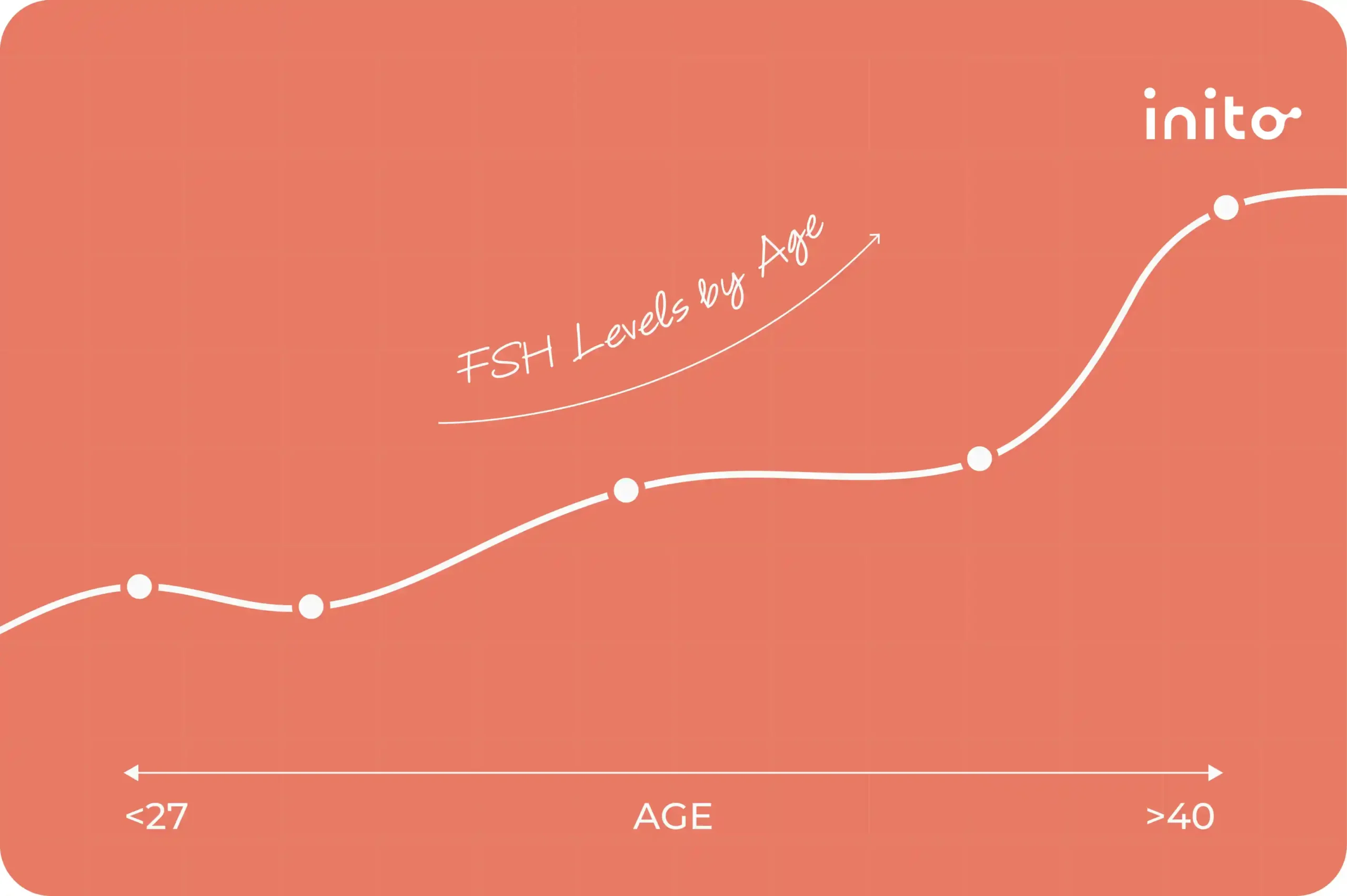Content table
As you proceed within your menstrual cycle, you know that your hormones are rising and falling. These hormones – follicle stimulating hormone (FSH), estrogen, luteinizing hormone (LH), and progesterone are regulating your fertility cycle each month. But, it’s hard to get a grip on what is happening in your body.
FSH is vital to fertility in men and women. If you’re trying to conceive, it’s essential to understand the role of FSH in the process.
But what does it mean if it’s high or low? Is it necessary to track your FSH along with LH, estrogen, and progesterone?
Do its levels change over time?
Let’s get clear on what FSH does, why it matters, when it’s high or low, and what are the normal FSH levels.
Key Takeaways
- FSH plays an important role in sexual development and fertility for men and women.
- Throughout your menstrual cycle, FSH fluctuates. It helps with follicle maturation and ovulation. It’s also important for developing fetal sex organs.
- During perimenopause, FSH rises. Then later on, it falls. High FSH may be an indicator of menopause for women who are over 40 years of age.
- FSH testing may be indicated in women who are having trouble conceiving. Having high or low FSH negatively impacts fertility. It’s more common to have high FSH, which is caused by PCOS, POI, and other illnesses.
- There’s no direct treatment for high FSH. Treatments focus on the cause of FSH irregularities.
What Is the FSH Hormone?
Follicle Stimulating Hormone (FSH) is released by the pituitary gland in the brain. It has a big impact on your fertility cycle, and fluctuates throughout the month. Here are FSH’s most important roles in men and women.
FSH in women:
- Keeps the menstrual cycle regular
- Stimulates follicle growth in the ovaries
- Helps tell the ovaries to make estrogen
FSH in men:
- Controls sperm production
- Tells the testes to make testosterone
FSH is a vital fertility hormone for men and women. It helps with follicle development, ovulation, semen production, and more.
Think of FSH as one in a team of fertility messengers. Along with Luteinizing Hormone (LH), it helps tell the ovaries what to do and when to do it. LH and FSH work closely together, so if one is low or high, the other may have a problem as well.
Like other fertility hormones, FSH levels change as you age. If you’re having problems with fertility, an FSH test could reveal why. Getting tested for FSH levels can tell you a lot about your fertility. More on testing for LH later on.
First, let’s get clear about what FSH does at different times in your cycle.
FSH Levels Throughout Your Cycle
FSH and the follicular phase:
The first stage of your fertility cycle is the follicular phase. During this time, FSH helps the follicles to develop. During this phase, one dominant follicle emerges. The mature follicle causes the ovaries to release estrogen.
With the rise in estrogen levels, FSH drops. This drop helps prevent another follicle from maturing.
FSH and ovulation:
FSH rises again right around ovulation, at the same time as LH. This FSH helps the follicle release an egg into the fallopian tube. It also makes your cells more sensitive to LH to capture the peak levels.
FSH and the luteal phase
The luteal phase is the duration from ovulation till your next period. During this phase, FSH is low. This suppresses follicle maturation while the reproductive system is trying to prepare for implantation and early pregnancy.
See how your hormone chart might look like!
Answer some questions to help us provide you a free personalized hormone chart customized to your hormonal health and conditions
FSH Hormone Levels
Normal FSH levels for men are 1.4 – 15.5 IU/mL. In women, normal values change based on the menstrual cycle.
Follicular Phase | 1.4 – 9.9 IU/mL |
Ovulatory Peak | 6.2 – 17.2 IU/mL |
Luteal Phase | 1.1 – 9.2 IU/mL |
Menopause | 19 – 100 IU/mL |

Early Follicular Phase | 4-12 mlU/ml |
Peak | upto 25 mlU/ml |
Late Follicular Phase & Luteal Phase | upto 10 mIU/ml |
FSH and Pregnancy
FSH levels are low during pregnancy, since you are not ovulating. There is some evidence that FSH also plays a role in the development of the placenta and umbilical cord. FSH may also contribute to maintaining pregnancy and help determine the timing of childbirth.
There is still a small peak in FSH during mid-pregnancy. This isn’t to stimulate follicle growth in the pregnant woman, but in the fetus.
FSH helps female fetuses form their own follicles during fetal development. In male fetuses, FSH plays a crucial role in testicle formation and prevents the development of female genitalia. This means that as you’re forming the next generation during your pregnancy, you’re also creating the building blocks for the generation after that as well. How cool is that?
FSH and Menopause
During the transition into menopause, FSH starts rising. This may even occur before estrogen levels begin to decline. Some researchers think that this increase in FSH may be linked to bone density loss in perimenopausal women. It’s partially responsible for the decrease in fertility as we age.
FSH declines after women have made the menopausal transition. Between 65 and 75, FSH levels decrease by 30-40%.
Can You Test Your FSH Levels?

Yes. Getting your FSH levels tested may be a good option if you’ve been trying to conceive for a year or more.
If you’re noticing irregular periods, or your periods have stopped, your doctor may recommend an FSH test. This may reveal problems with ovarian function. FSH levels can also indicate early menopause.
As you know, FSH comes from your pituitary gland. If you’re having symptoms of a pituitary gland disorder, your doctor may also want to test for FSH. These symptoms include loss of appetite, fatigue, weight loss, and weakness.
Fertility doctors use FSH to determine ovarian reserve in women. This means the amount of eggs that a woman has in her ovaries, and it’s linked to the potential for conceiving.
But in the last few years, we’ve learned that FSH alone isn’t the best indicator. AMH, or Anti-Mullerian Hormone and Antral Follicular Count (AFC), are also used to determine ovarian reserve.

You may get panicky when we talk about ovarian reserve.
But remember that even if you don’t have many follicles, it’s still possible to get pregnant.
It only takes one fertilized egg to make a baby. Testing for FSH and AMH can tell you how many eggs are left for conception. It definitely does not tell you whether or not you can get pregnant.
You can test for FSH levels using at-home testing kits, or by going into your doctor’s office.
Levels are typically checked on the third day of your cycle. An FSH level cannot diagnose problems with fertility, but it can help your doctor see if there is a problem.
These tests may also tell you if you need to change your timeline for trying to get pregnant.
What Do Low FSH Levels Indicate?
Low FSH may indicate that your ovaries are not making enough eggs. FSH is essential for maturing follicles, so it’s impossible to conceive without enough of it.
It’s pretty rare to have FSH levels that are too low. Having low FSH is a symptom of another problem, and can cause lengthened menstrual cycles.
Low FSH levels are typically associated with problems in the hypothalamus or pituitary gland. Being severely underweight can also cause low levels of FSH.
What Do High FSH Levels Indicate?
High FSH also causes problems with fertility. High levels of FSH may indicate that the ovaries are not responding, so the pituitary is secreting FSH on overdrive. It can also mean that the pituitary gland is over functioning independently. Check out these causes for high FSH in women:

- Primary Ovarian Insufficiency (POI), or premature ovarian failure: This is when the ovaries lose function before a woman reaches 40. It’s normal for the ovaries to stop functioning during the menopausal transition slowly. It’s not normal for it to happen so early, since the average age for menopause to begin is 45-55.
- Polycystic Ovary Syndrome (PCOS): This hormonal disorder is the leading cause of female infertility. Scientists are still not sure what causes it, but it’s associated with high levels of androgen hormone. This causes problems with ovulation, and other symptoms like hair growth and weight gain.
- Menopause or Perimenopause: If you’re over 40, increasing FSH is an expected part of the transition into menopause.
- Ovarian Tumors: Cancer in the ovaries can cause an elevation in FSH levels. But it’s more common for ovarian tumors to cause low FSH.
- Turner’s Syndrome: This is a genetic problem that causes hormone irregularities in girls and women. Women with Turner’s syndrome don’t secrete enough estrogen, resulting in delayed puberty and infertility.
Is There a Treatment for High FSH in Women?
Remember that high FSH is an indicator, not a cause for low fertility. It also fluctuates month-to-month. So just because your level is high one cycle, it doesn’t necessarily mean it will be high the next.
Estrogen pills and birth control lower FSH, but these may not be appealing for women who are trying to conceive.
There are ways to boost your chances of conceiving even if your FSH is high. Advanced fertility technology like In Vitro Fertilization (IVF) can help women with FSH problems to conceive. These treatments often use synthetic FSH to tell the ovaries to mature several follicles at once. Then these mature follicles are harvested for fertilization.
For some women with high FSH, using donated eggs may be the best way to conceive. Finding out you have elevated FSH is only the first step on your fertility journey. Speak with your fertility doctor about getting pregnant despite high FSH levels.
Was this article helpful?
-
- Hall J. E. (2015). Endocrinology of the Menopause. Endocrinology and metabolism clinics of North America, 44(3), 485–496. https://doi.org/10.1016/j.ecl.2015.05.010
- Jirge P. R. (2011). Ovarian reserve tests. Journal of human reproductive sciences, 4(3), 108–113. https://doi.org/10.4103/0974-1208.92283
- McSorley, M. A., Alberg, A. J., Allen, D. S., Allen, N. E., Brinton, L. A., Dorgan, J. F., Kaaks, R., Rinaldi, S., & Helzlsouer, K. J. (2009). Prediagnostic circulating follicle stimulating hormone concentrations and ovarian cancer risk. International journal of cancer, 125(3), 674–679. https://doi.org/10.1002/ijc.24406
- Orlowski M, Sarao MS. Physiology, Follicle Stimulating Hormone. 2022 May 8. In: StatPearls [Internet]. Treasure Island (FL): StatPearls Publishing; 2022 Jan–. PMID: 30571063.
- Reed BG, Carr BR. The Normal Menstrual Cycle and the Control of Ovulation. [Updated 2018 Aug 5]. In: Feingold KR, Anawalt B, Boyce A, et al., editors. Endotext [Internet]. South Dartmouth (MA): MDText.com, Inc.; 2000-. Available from: https://www.ncbi.nlm.nih.gov/books/NBK279054/
- Ruth, K. S., Beaumont, R. N., Tyrrell, J., Jones, S. E., Tuke, M. A., Yaghootkar, H., Wood, A. R., Freathy, R. M., Weedon, M. N., Frayling, T. M., & Murray, A. (2016). Genetic evidence that lower circulating FSH levels lengthen menstrual cycle, increase age at menopause and impact female reproductive health. Human reproduction (Oxford, England), 31(2), 473–481. https://doi.org/10.1093/humrep/dev318
- Shaw ND, Histed SN, Srouji SS, Yang J, Lee H, Hall JE. Estrogen negative feedback on gonadotropin secretion: evidence for a direct pituitary effect in women. J Clin Endocrinol Metab. 2010 Apr;95(4):1955-61. doi: 10.1210/jc.2009-2108. Epub 2010 Feb 4. PMID: 20133465; PMCID: PMC2853991.
- Stilley, J., & Segaloff, D. L. (2018). FSH Actions and Pregnancy: Looking Beyond Ovarian FSH Receptors. Endocrinology, 159(12), 4033–4042. https://doi.org/10.1210/en.2018-00497
- U.S. National Library of Medicine. (n.d.). Follicle-stimulating hormone (FSH) levels test: Medlineplus medical test. MedlinePlus. Retrieved May 26, 2022, from https://medlineplus.gov/lab-tests/follicle-stimulating-hormone-fsh-levels-test/
- Zinaman, Michael J. MD; Johnson, Sarah PhD; Warren, Graham PhD HCG and FSH Levels During Early Pregnancy and Reproductive Aging [24A], Obstetrics & Gynecology: May 2020 – Volume 135 – Issue – p 14S doi: 10.1097/01.AOG.0000663040.89933.37












